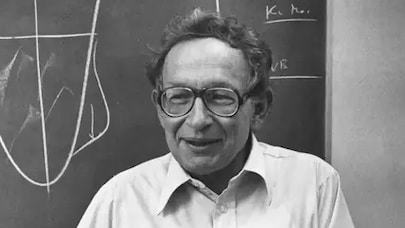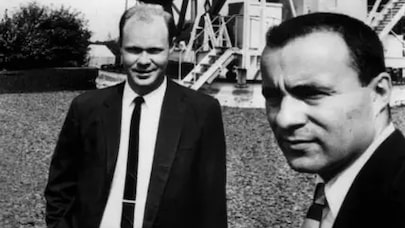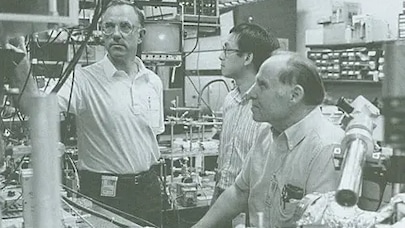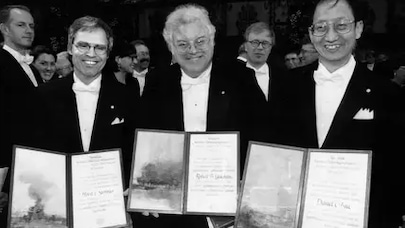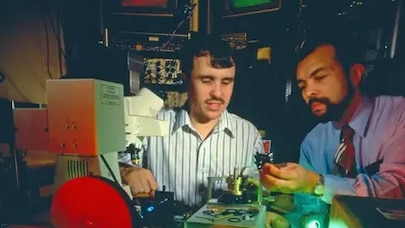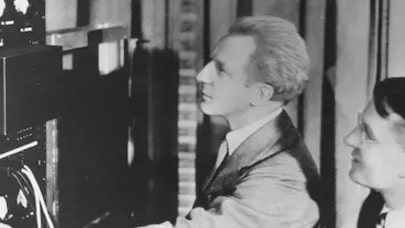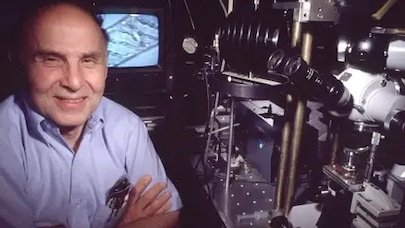About the Bell Labs Prize
The Bell Labs Prize recognizes game-changing innovations in science, technology, engineering and mathematics.
Geared toward innovative proposals that look to solve broader societal and humanistic challenges, the competition continues Nokia Bell Labs‘ rich tradition of finding solutions that have a transformative impact on the information and telecommunication industry.
Imagine the future and we will help you invent it with cash prizes that can help propel your idea forward. In addition, all three winners are considered for opportunities to work alongside Nokia Bell Labs researchers to further explore their ideas.
2023 competition
Ariane De Vroede, PhD student in Electrical Engineering at KU Leuven, and Patrick Reynaert, Professor in Department of Electrical Engineering at KU Leuven, won the 2023 Bell Labs Prize for their innovation of highly sensitive THz imaging using self-oscillating pixels.
De Vroede is pictured between Bell Labs Core Research President Petter Vetter (left) and Bell Labs Solutions Research President Thierry Klein.

Bell Labs Prize stories
2023
Bell Labs Prize winners close the THz gap with inexpensive harmonic sensors
The winners of the 2023 Bell Labs Prize are shining a light into a blind spot for today’s sensing technologies. Referred to as the THz gap, it comprises an area between 0.1 THz and 10 THz where there are no practical sensors available for capturing the information it contains. Ariane De Vroede, Research Assistant and doctoral candidate in Electrical Engineering at KU Leuven in Belgium, and Patrick Reynaert, Professor at KU Leuven, Department of Electrical Engineering, have proposed a unique harmonic solution that may allow us to access the THz gap using compact, low power and inexpensive image sensors.
2022
Bell Labs Prize winners have designed a computer memory chip for the big-data era
The winner of the 2022 Bell Labs Prize is tackling a challenge unique to the era of big-data computing: the problem of memory. University of Pennsylvania (Penn) professors Deep Jariwala, Troy Olsson and Eric Stach have developed a form of computer memory that integrates tightly with microprocessors - a new high-density, low-power memory device which could process reams of data much faster than traditional compute architectures.
2021
Capturing the Sun in a box: Thermal battery inventor wins the 2021 Bell Labs Prize
Instead of burning carbon in the form of coal and other fossil fuels to produce energy, Asegun Henry wants to use carbon as the primary means to store energy generated from renewable sources. Such a technology could go a long way to fully decarbonizing the power grid and drastically cut CO2 emissions.
2020
Bell Labs Prize winner devises an image-recognition technology powered by light
The camera in your smartphone may one day do more than just snap pictures and record videos. A new photonics technology developed by this year’s Bell Labs Prize winner Firooz Aflatouni could turn the smartphone into the ultimate image-recognition device, capable of instantly identifying anything or any context before you ever press the “take picture” button.
2019
Bell Labs Prize winners replicate the power of quantum computing on a chip
Two UC Berkeley researchers collaborating with Nokia Bell Labs have designed a chip that can efficiently solve an important class of computational problem once thought to require quantum computers.
2018
Sweet victory...the 2018 Bell Labs Prize winners
Samory Kpotufe's submission, "Teach a Machine to Draw, Ask it to Paint" is the winner of the 5th annual Nokia Bell Labs Prize.
2017
And the winner is...2017 Bell Labs Prize
Kaushik Sengupta, Assistant Professor in Electrical Engineering at Princeton University, wins for his invention of a radical new transceiver chip technology that could power a truly universal software-defined reconfigurable radio
2016
Sungwon Chung, Hossein Hashemi, and Hooman Abediasl for “Large-Scale Plasmonic Optical Phased Array”









